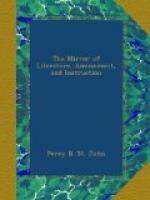In lecturing, Mr. Abernethy’s manner was peculiar, abrupt, and conversational; and often when he indulged in episodes and anecdotes he convulsed his class with laughter, especially when he used to enforce his descriptions by earnest gesticulation. Frequently, while lecturing, he would descend from his high stool, on which he sat with his legs dangling, to exhibit to his class some peculiar attitudes and movements illustrative of the results of different casualties and disorders; so that a stranger coming in, unacquainted with the lecturer’s topics, might easily have supposed him to be an actor entertaining his audience with a monologue, after the manner of Matthews or Yates. This disposition, indeed, gave rise to a joke among his pupils of “Abernethy at Home,” whenever he lectured upon any special subject. In relating a case, he was seen at times to be quite fatigued with the contortions into which he threw his body and limbs; and the stories he would tell of his consultations, with the dialogue between his patient and himself, were theatrical and comic to the greatest degree.
Northcote and the present King.
A certain Royal Duke was at the head of those who chaperoned Master Betty, the young Roscius, at the period when the furor of fashion made all the beau monde consider it an enviable honour to be admitted within throne-distance of the boy-actor. Amongst others who obtained the privilege of making a portrait of this chosen favourite of fortune, was Mr. Northcote.
The royal Duke to whom we allude was in the habit of taking Master Betty to Argyll Place in his own carriage; and there were usually three or four ladies and gentlemen of rank, who either accompanied his Royal Highness, or met him at the studio of the artist.
Northcote, nothing awed by the splendid coteries thus assembled, maintained his opinions upon all subjects that were discussed,—and his independence obtained for him general respect, though one pronounced him a cynic—another an eccentric—another a humorist—another a free-thinker—and the prince, with manly taste, in the nautical phrase, dubbed him a d——d honest, independent, little old fellow.
One day, however, the royal Duke, being left with only Lady ——, the young Roscius, and the painter, and his patience being, perhaps, worn a little with the tedium of an unusually long sitting, thought to beguile an idle minute by quizzing the personal appearance of the Royal Academician. Northcote, at no period of life, was either a buck, a blood, a fop, or a maccaroni; he soon dispatched the business of dressing when a young man; and, as he advanced to a later period, he certainly could not be called a dandy. The loose gown in which he painted was principally composed of shreds and patches, and might, perchance, be half a century old; his white hair was sparingly bestowed on each side, and his cranium was entirely bald. The royal visiter, standing behind him whilst he painted, first gently lifted, or rather twitched the collar of the gown, which Mr. Northcote resented, by suddenly turning and expressing his displeasure by a frown. Nothing daunted, his Royal Highness presently, with his finger, touched the professor’s grey locks, observing, “You do not devote much time to the toilette, I perceive—pray how long?”




